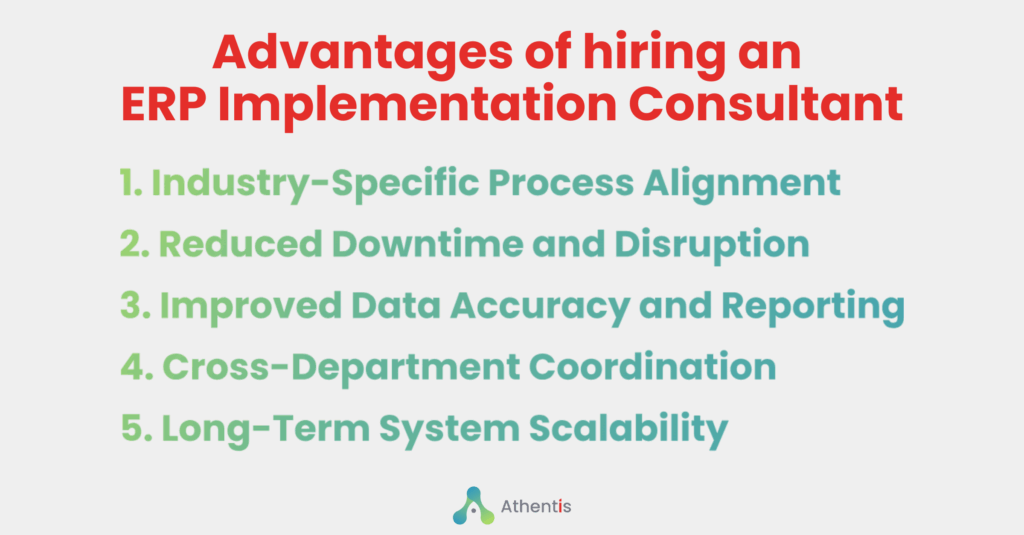An ERP implementation consultant plays a critical role in helping businesses navigate complex digital transformations. For industries like food and beverage, fashion, and equipment services, implementing ERP isn’t just about software, it’s about aligning people, processes, and technology.
The right consultant brings industry-specific knowledge and technical expertise to the table, guiding teams through each phase, from scoping to system go-live. They help avoid costly missteps, reduce downtime, and ensure the ERP solution supports real business outcomes.
In this post, we’ll break down what an ERP implementation consultant actually does, why their role is essential, and how to choose the right one for your business. If you’re considering an ERP rollout or struggling to get results from your current system, this guide will show you what it takes to get it right.
Let’s dive in!
What is an ERP Implementation Consultant?
An ERP implementation consultant is a specialized expert who guides companies through the successful deployment of Enterprise Resource Planning systems. Their job goes far beyond software setup, they align ERP functionality with the unique workflows, compliance needs, and goals of your business.
For industries like food and beverage, fashion, wholesale distribution, and equipment services, this alignment is critical to avoid costly delays and achieve lasting operational efficiency. At Athentis Consulting, our ERP consultants bring deep expertise in supply chain, manufacturing, maintenance, and business intelligence.
This cross-functional knowledge allows us to design ERP systems that don’t just work—but work for you. The right consultant understands how inventory, production, and service workflows connect, and how to turn that complexity into clarity.
Our consultants lead every stage of the ERP journey:
- Assessment & Planning: Audit current systems and define ERP goals based on vertical-specific challenges.
- Execution & Coordination: Align manufacturing, supply chain, and maintenance teams under a unified system.
- Data Management: Migrate, clean, and structure data to support decision-making and BI integration.
- Training & Support: Guide your teams in adoption, minimizing downtime and maximizing ROI.
- Continuous Optimization: Fine-tune workflows to meet regulatory and operational shifts across your industry.
With Athentis, your ERP investment isn’t just implemented, it’s activated to drive performance across the entire value chain.
Advantages of Hiring an ERP Implementation Consultant

Implementing an ERP system is a high-stakes move, especially in industries like food and beverage, fashion, wholesale distribution, and equipment services, where operations are complex and timing is critical.
Hiring an ERP implementation consultant brings specialized expertise that helps ensure the system is not only set up correctly but also drives real business value from day one.
1. Industry-Specific Process Alignment
ERP systems are only as effective as they fit with your business model. An experienced consultant understands the nuanced workflows of industries like food production, apparel logistics, or equipment service. They tailor configurations to match industry regulations, seasonal demands, and production cycles, ensuring the ERP reflects how your business actually operates.
2. Reduced Downtime and Disruption
ERP transitions are notorious for causing operational delays. A consultant minimizes that risk by coordinating phased rollouts, managing cross-functional dependencies, and proactively addressing bottlenecks. This is especially crucial in time-sensitive sectors like wholesale and distribution, where even short disruptions can ripple across the supply chain.
3. Improved Data Accuracy and Reporting
ERP consultants ensure your data is clean, structured, and migrated properly, laying the foundation for accurate business intelligence. This is key in manufacturing and maintenance-heavy environments where real-time insights into inventory, machine uptime, and resource use directly impact performance and profitability.
4. Cross-Department Coordination
ERP implementations require collaboration across procurement, operations, finance, and IT. A skilled consultant brings structure to this complexity, helping departments align on shared goals and workflows. This coordination ensures that teams in fast-paced industries like fashion or food service aren’t working in silos, and instead, move forward together.
5. Long-Term System Scalability
Beyond go-live, ERP consultants design systems that evolve with your business. Whether you’re expanding product lines, opening new distribution channels, or scaling service operations, their foresight helps you avoid rework. For growth-oriented businesses, this future-ready approach keeps operations agile and competitive.
Hiring an ERP implementation consultant isn’t just a short-term fix, it’s a strategic investment. Their ability to bridge industry knowledge with technical execution helps businesses avoid costly missteps, streamline operations, and build ERP systems that can scale with confidence.
For any company navigating complex workflows, that expertise can be the difference between a system that runs, and a system that drives real value.
Key Takeaway
An ERP implementation consultant plays an essential role in ensuring your system is tailored, scalable, and aligned with your business operations, especially in industries with complex supply chains and fast-moving production cycles. Their expertise minimizes risk, maximizes ROI, and turns ERP systems into strategic assets rather than operational headaches.
Before starting an ERP project, assess your internal capabilities and identify gaps where expert guidance is needed. Bringing in a consultant early can prevent delays, align cross-functional teams, and ensure the system supports your long-term goals, not just immediate needs.
Want to see how expert ERP guidance could transform your next project? Explore our consulting services to discover how we help businesses streamline operations, boost data accuracy, and build systems that scale.



